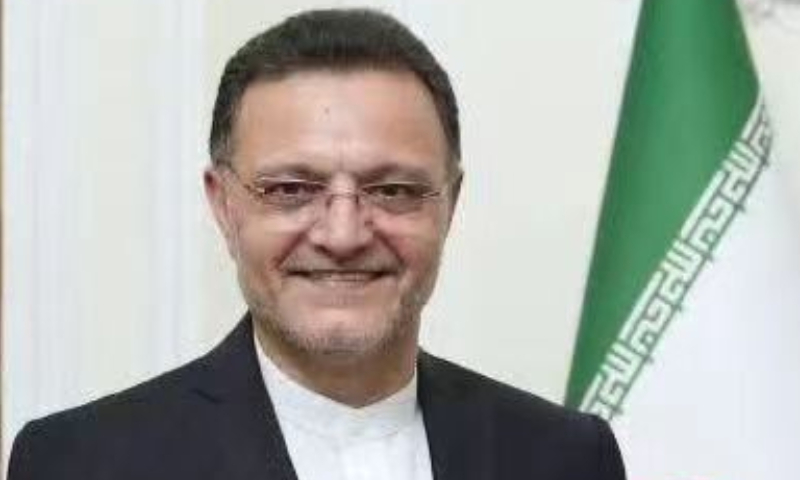
Iranian Ambassador to China Mohsen Bakhtiar Photo: Courtesy of Iranian Embassy in Beijing
The changes that have taken place in the Xinjiang Uygur Autonomous Region, especially in the last decade, have been fundamental and astonishing. The construction of infrastructure in areas such as commerce, economy, transportation, agriculture, industry, trade, technology, energy, and culture has been remarkable, said Iranian Ambassador to China Mohsen Bakhtiar.
Bakhtiar noted that he is very optimistic about the bright prospects of economic cooperation between Xinjiang and Iran.
Recently, Bakhtiar, together with diplomats from other countries visited Xinjiang and personally witnessed how people live in Xinjiang, which greatly impressed the Iranian diplomat.
The Iranian Embassy in China released several "Iranian diplomat Xinjiang journals" on China's social media platform Sina Weibo, which recorded the ambassador's visit to Xinjiang and were well received by Chinese netizens.
According to the Iranian diplomat, under the framework of the Belt and Road Initiative (BRI) that China proposed, they can leverage historical advantages to expand cooperation between Xinjiang, which plays a crucial role under the BRI, and different Iranian provinces, facilitating the transit and transportation of goods.
Bakhtiar mentioned that for thousands of years, Iran and China, as two great Asian civilizations, have engaged in long-term exchanges and cooperation. This communication has been effective in promoting economic growth, cultural development, and social progress.
During his visit to Xinjiang, Bakhtiar visited Kashi, an ancient city in the region, a mosque, and an apricot orchard, and had face-to-face exchanges with local residents to gain a firsthand understanding of the social development, protection of ethnic and religious culture, and the lives of the people in Xinjiang.
In the Kizil Thousand-Buddha Caves, Bakhtiar also appreciated the cave art that spans thousands of years. In his view, Xinjiang is China's western gateway to Central Asia, Iran, and Europe. The ancient works here prove the close connection between Iranians, other Central Asian peoples, and the people of this region.
"Today, the Silk Road has reemerged in the form of the BRI, in which Xinjiang continues to play a crucial role," he said. "Interestingly, the railways and highways that connect China with Central Asia, West Asia, and Europe all pass through Xinjiang."
The visit left a deep impression on Bakhtiar. "We have gained a better understanding of the beautiful Xinjiang and the achievements China has made in this region. Looking back, the changes in Xinjiang, especially in the last decade, have been fundamental and astonishing. The construction of infrastructure in areas such as commerce, the economy, transportation, agriculture, industry, trade, technology, energy, and culture has been remarkable," Bakhtiar said.
Iran joined the BRI in 2016. "In terms of transportation links between China, West Asia, and Europe, Iran hopes to play a greater role and focus on establishing deeper economic, cultural, and social partnerships with Xinjiang," he said.
According to Bakhtiar, Xinjiang has established a friendly city MOU with Iran's Khorasan Province, which is one of the largest provinces in Iran, located in the northeast of the country.
With China's opening-up, Xinjiang has transformed from a relatively closed inland region to a frontier of openness. "I am very optimistic about the bright prospects of economic cooperation between Xinjiang and Iran," Bakhtiar said.
He also noted that Iran is willing to further expand its cooperation with Xinjiang in areas such as trade, the economy, agriculture, rail, tourism, the establishment of sister cities, and culture. Cooperation and exchanges between Iranian and Xinjiang delegations have also seen an increase in the recent past.
"For example, the Iranian Chamber of Commerce and the Xinjiang Trade Promotion Association have signed a memorandum of cooperation, and activities such as increasing trade and investment opportunities, and deepening economic and trade relations are being carried out. Both sides are also paying attention to areas such as technology, education, and healthcare," said Bakhtiar.
On July 4, 2023, the Shanghai Cooperation Organization (SCO) officially accepted Iran as a member state during its 23rd Council of Heads of State meeting. With this addition to the organization, the SCO now has a total of nine member countries.
Bakhtiar said that this membership brings new possibilities for the expansion of bilateral relations. He highlighted that the SCO provides valuable opportunities for member states to engage in practical cooperation in various fields, including transportation, counter-terrorism, energy, economic cooperation, and people-to-people exchanges. By actively participating in SCO initiatives and through this regional organization, member states can enhance their regional status, strengthen economic cooperation, and contribute to each other's common development and security.




